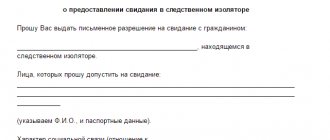Types of criminal penalties
Imprisonment is the main type of criminal punishment, which consists of isolating the offender in special-purpose institutions with a certain regime for serving the sentence.
The restriction consists in the establishment by the court of a set of restrictive measures in relation to the convicted person, which may consist of the following:
- do not change your place of permanent residence or stay for a certain period of time;
- do not visit designated places;
- do not travel outside the established territory;
- do not participate in or attend public events;
- do not change your place of work without the consent of a specialized government agency.
In accordance with Part 2 of Art. 53 of the Criminal Code of the Russian Federation:
the restriction is imposed from two months to four years as the main type of punishment for crimes of minor gravity and crimes of medium gravity, as well as from six months to two years as an additional type to forced labor or imprisonment in cases provided for by the relevant articles of the Special Part of this Code .
Correctional labor is the labor activity of a convicted person for a period of 2 months to 2 years at the main place of work, accompanied by the withholding of 5 to 20% of earnings to the state. Article 50 of the Criminal Code of the Russian Federation. Compulsory work is characterized by the convicted person performing socially significant and useful actions in his free time. According to Part 2 of Art. 49 of the Criminal Code of the Russian Federation:
Compulsory work is set from sixty to four hundred and eighty hours and is served no more than four hours a day.
Currently
According to the current legislation, namely the Criminal Code of the Russian Federation, Part 3 of Article 72, the calculation of terms and the calculation of punishment is carried out according to the following principle:
the time a person is held in custody before trial is counted towards the terms of imprisonment, forced labor, detention in a disciplinary military unit and arrest at the rate of one day for one day, restriction of freedom - one day for two days, correctional labor and restrictions on military service - one a day for three days, and for compulsory work - at the rate of one day of detention for eight hours of compulsory work.
For clarity, you can present part 3 in the form of a small table:
1 day in a pre-trial detention center =
- 1 day of arrest;
- 1 day of imprisonment;
- 1 day of forced labor;
- 2 days of restriction of freedom;
- 3 days of correctional labor;
- 3 days of restrictions on premium;
- 8 hours of compulsory work.
Nothing more is currently provided for by law. These are the provisions that are in effect now, and rumors to the contrary are false.
Meaning of the word count
Examples of the use of the word count in literature.
For example, under a special agreement, special agricultural activities could be counted toward the rent.
In this case, the time spent serving the restriction of freedom is counted towards the term of imprisonment at the rate of one day of imprisonment for one day of restriction of freedom.
The time a person is held in custody before trial is counted towards the terms of imprisonment, detention in a disciplinary military unit and arrest at the rate of one day for one day, restrictions on freedom - one day for two days, correctional labor and restrictions on military service - one day for three days, and during the period of compulsory work - at the rate of one day of detention for eight hours of compulsory work.
The time of holding a person in custody before the court verdict enters into legal force and the time of serving imprisonment imposed by a court verdict for a crime committed outside the Russian Federation, in the case of extradition of a person on the basis of Article 13 of this Code, are counted at the rate of one day for one day.
In the event that goods are shipped by the supplier to several recipients specified in the supply agreement or the buyer's shipping order, goods delivered to one recipient in excess of the quantity provided for in the contract or shipping order are not counted toward covering shortfalls to other recipients, unless otherwise provided in the contract.
In cases where the supply of goods of the same name is carried out by the supplier to the buyer simultaneously under several supply contracts and the quantity of goods supplied is not enough to pay off the supplier’s obligations under all contracts, the delivered goods must be counted towards the fulfillment of the contract specified by the supplier when making the delivery or without delay after delivery.
If the buyer has paid the supplier for goods of the same name received under several supply contracts, and the payment amount is not enough to repay the buyer’s obligations under all contracts, the amount paid must be counted towards the fulfillment of the contract specified by the buyer when paying for the goods or without delay after payment.
When recalculating for services not provided, the amount of the payment reduction is counted toward future payments.
IBAs from Mary and Chirchik were involved in combat work almost every year, flying as replacements or based at border airfields, flights from which were counted as flight-tactical exercises.
The supply of goods of one name in a larger quantity than provided for in the supply contract does not count toward the shortfall of goods of another name included in the same assortment, and is subject to replenishment, except in cases where such delivery is made with the prior written consent of the buyer.
Tempograd clocks count as space clocks, tenfold.
The loan was issued to the landowner in interest-bearing papers and was counted against the peasants as a government debt.
Amounts of money received from the borrower to fulfill an obligation under a loan agreement are included in the bank’s income only if, in accordance with Article 319 of the Civil Code of the Russian Federation and the terms of the loan agreement, they are counted towards the repayment of interest for the use of borrowed funds. The commercial bank applied to arbitration court with a claim to invalidate the tax inspectorate's decision to recover understated profits and apply financial sanctions.
The hero's correct judgment about his own situation is counted toward his justification, and a false one is imputed to him as guilt.
The time spent serving correctional labor was counted in the total length of service, however, it was not included in the length of service giving the right to receive benefits and salary bonuses.
Source: Maxim Moshkov library
What's planned
Surely many, if not all, who have any relation or interest in this topic have heard about the Bill numbered 73983-5 dated June 20, 2008. The main idea of this bill is to amend Article 72 of the Criminal Code of the Russian Federation:
on counting the time of holding a person in custody before the court verdict enters into legal force into the term of serving a sentence of imprisonment.
That is, it is proposed to add an amendment to the provisions currently in force (described above), which will equate the credit of 1 day in a pre-trial detention center to 1.5 days in a general and strict regime colony and 1.5 days in an educational colony. The verbatim text of the proposed changes with the latest amendments is as follows:
The period of imprisonment includes the time a person is held in custody before arriving at the place where the sentence is to be served, at the rate of one day for:
- one day of serving a sentence in a prison and special regime correctional colonies, as well as the stay of a convict serving a sentence in a general regime correctional colony, educational colony or settlement colony, in strict conditions, in a punishment or disciplinary isolator, a cell-type room or a single cell-type room , in accordance with articles 115 and 136 of the Criminal Executive Code of the Russian Federation;
- one and a half days of serving in a correctional colony of general and strict regime or an educational colony;
- two days of serving in a colony settlement.
The procedure for counting the time a person is held in custody before a court sentence enters into legal force into a term of imprisonment is determined by the Ministry of Justice of the Russian Federation.
This bill has received enormous support from citizens, since many equate a pre-trial detention center and a prison to the same thing, and it is worth saying that these opinions are not without meaning, since the conditions of detention are really close. Indeed, the conditions in the pre-trial detention center are not much different from those in prison, and in order to get into the pre-trial detention center, no special effort is required.
Recalculation of punishment in pre-trial detention center
According to Part 3.1 of Art. 72 of the Criminal Code of the Russian Federation, the day of detention is equivalent to:
- to one day of the convict’s stay in prison, a strict or special regime colony;
- to one and a half days of punishment in an educational or correctional colony of general detention;
- to two days of punishment in a penal colony.
This part of Article 72 of the Criminal Code was introduced by Part 2 of Art. 1 Federal Law No. 186, signed by the President of Russia on July 3, 2018.
The point of this article is to equalize the conditions of punishment throughout its entire term - from arrest to release. If the conditions of stay in a pre-trial detention center are significantly worse than the conditions of punishment provided for by a court decision, then the total time of serving the sentence should be reduced. Otherwise, it turns out that a citizen who has committed a crime is punished more severely than provided for by the relevant article of the Criminal Code.
Starting from July 2022, it became possible to recalculate the total sentence for convicted persons and reduce the time they spent in custody.
In court decisions after July 2022, this norm should be reflected in the effective part of the sentence, but due to various circumstances that did not allow the court to apply this norm when passing a sentence, the convicted person, with the help of a lawyer, can go to court at the place of serving the sentence. The same opportunity is provided to all citizens convicted before July 3, 2022.
Attempts to change the Criminal Code in a similar way were made by human rights activists back in 2008, when a corresponding draft was submitted to the State Duma. The experts explained their position by the harsh conditions of detention of citizens in pre-trial detention centers, which are equivalent to the conditions of prisoners in high-security colonies. Such punishment was not always equivalent to the citizen’s guilt.
Amnesty in Russia in 2020
It was quite difficult to change the conditions of stay in the pre-trial detention center due to the obsolescence of Russian prisons and the increasing flow of people placed in custody. It was not possible to solve the problem, which simultaneously required significant funds, in a short time, so the state decided to introduce a standard for reducing the total sentence.








